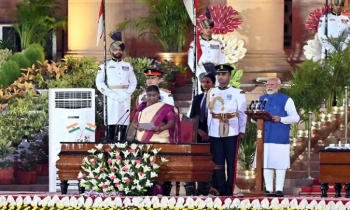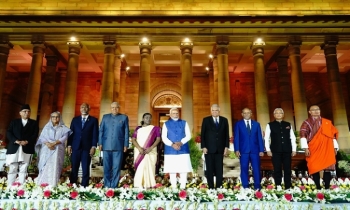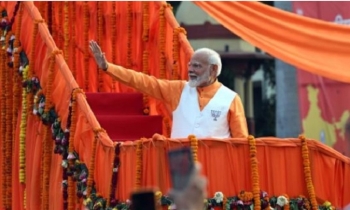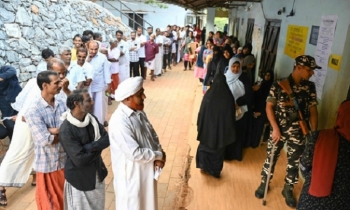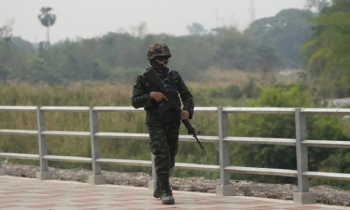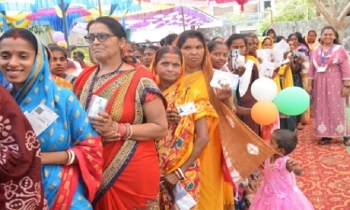Strikes and sanctions mark Myanmar coup anniversary
BI Desk || BusinessInsider

Photo: Collected
Pro-democracy activists in Myanmar are holding a “silent strike” to mark two years since a military coup that removed Aung San Suu Kyi from power.
Streets in many cities fell quiet after protesters urged people to stay indoors and asked businesses to close, reports BBC.
Meanwhile, the military administration in the country has extended a state of emergency for six months.
The UK, US, Canada and Australia have announced fresh sanctions against army-linked firms.
Large parts of Myanmar descended into chaos after the government’s overthrow two years ago, displacing more than a million people.
The army had made allegations of widespread fraud in a vote held months earlier, in November 2020, which Ms Suu Kyi’s National League for Democracy (NLD) won with more than 80% of the vote.
The military’s claims have been dismissed as baseless by the vast majority of the international community, and plans to hold new elections to cement junta rule have been dismissed as a “sham”, including by the UN.
Thinzar Shunlei Yi, a pro-democracy activist, said resistance against the military was continuing, particularly in rural areas.
“The main message of the silent strike is to honour the fallen heroes and heroines and to reclaim the public space as our own,” she told the BBC, adding that the aim was to send a clear message that the military “shall never rule us”.
Protesters also gathered outside Myanmar’s embassies in Thailand and Japan, chanting anti-military slogans and holding portraits of Ms Suu Kyi.
A small pro-military demonstration took place in Yangon, where an estimated 200 supporters marched through the city centre escorted part of the way by soldiers, AFP news agency reported.
Two years after the coup, which catastrophically misread the public mood in Myanmar, the statistics tell their own, dismal story.
More than 2,900 people have been killed during the junta’s crackdown on dissent, according to monitoring group the Assistance Association for Political Prisoners.
One-and-a-half million people have been displaced, 40,000 homes have been burned down, eight million children are no longer in school, and 15 million people are judged by the UN to be dangerously short of food.
Much of the country is caught up in a brutal civil war. Yet the military is still refusing to negotiate with its opponents, as it promised to do in a meeting with neighbouring countries shortly after the coup.
Instead, it has plans for an election which would almost certainly exclude Ms Suu Kyi, who resoundingly won the last election, and much of her party, the NLD.
Those loyal to her are calling on citizens to boycott any poll organised by the military, arguing it would be illegitimate and impractical. The UN says these would be “sham elections”.
The military’s acknowledgement this week that it had failed to normalise the situation may force it to postpone the election - originally scheduled for August this year - having now extended the state of emergency, prolonging the grim stalemate in which Myanmar is trapped.
Western nations used Wednesday’s anniversary to coordinate new rounds of sanctions against the military and its supporters.
The UK targeted, among others, companies supplying aviation fuel to the military, which it said were “enabling its barbaric air-raiding campaign in an attempt to maintain power”.
British Foreign Secretary James Cleverly said the sanctions were aimed at “reducing the military’s access to finance, fuel, arms and equipment”.
Australia announced its first sanctions against the military, aimed at 16 individuals “responsible for egregious human rights abuses”, as well as two major military-controlled conglomerates, which dominate the country’s economy.
Sanctions by the US targeted the military-approved election commission, which “the regime has deployed to advance its plans for deeply flawed elections”.
The National Unity Government - a parallel administration that leads opposition to the military - welcomed the sanctions, calling them “significant measures” to tackle the conflict, particularly air strikes by the military.
It called on countries to place further “aggressive, targeted sanctions” on the military regime and those who supported and supplied it.
Amnesty International’s Montse Ferrer told the BBC that moves to stop the supply of aviation fuel to the Myanmar military were “an important step” but that more needed to be done.
“Other states should follow Canada’s lead in suspending the direct and indirect supply, sale or transfer - including transit, trans-shipment and brokering - of aviation fuel to Myanmar,” she said.



